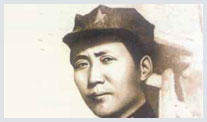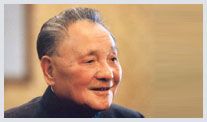|
| Establishment and development
|
| 2002-09-05 12:27:36 |
After the October Socialist Revolution in the former Soviet Union led by Lenin was victorious in 1917, Marxism spread to China. Some advanced Chinese intellectuals realized that Marxism was the true way of guiding the revolution to victory.
In 1919, the May 4th Movement against imperialism and feudalism broke out in China. It awoke the Chinese people in an unprecedented way. After the movement, the Chinese working class, as an independent political force, entered the historical arena.
A large number of revolutionary intellectuals who believed in Marxism including Chen Duxiu, Li Dazhao and Mao Zedong set up communist groups across the country to spread Marxism and organized workers' movements. Marxism was thus integrated with the Chinese workers' movements, laying a foundation for the establishment of the CPC.
Between July 23 and 31, 1921, Mao Zedong, He Shuheng, Dong Biwu, Chen Tanqiu, Wang Jinmei, Deng Enming, Li Da, Li Hanjun, Zhang Guotao, Liu Renjing, Chen Gongbo and Zhou Fohai, representing 50-odd members of various communist groups, held the first National Congress of the CPC, and the Communist Party of China was therefore officially founded.
After its establishment, the CPC led Chinese people in unfolding the New-Democratic Revolution against imperialism, feudalism and bureaucrat-capitalism (1919-1949). The revolution was divided into four periods: the Northern Expedition (1924-1927) of Kuomintang-Communist cooperation, the Agrarian Revolutionary War (1927-1937), the War of Resistance Against Japan (1937-1945) and the Chinese People's War of Liberation (1946-1949).
With long-term armed struggles and the close coordination of various aspects and various forms of struggles, the CPC finally achieved a victory in 1949 and established the People's Republic of China.
After the founding of the PRC, the CPC led the nation to make constant progress: triumphing over repeated threats, sabotages and armed provocation of imperialists and hegemonists; safeguarding the nation's independence and security; successfully achieving a great transfer of the Chinese society from new-democratism to socialism; and launching the large-scale socialist economic construction in a planned way, and enabling Chinese economic and cultural causes to attain unprecedented development.
Beginning in 1979, China introduced reforming policies advocated by Deng Xiaoping and opened its door to the outside world. The "left deviation" errors made during the "Cultural Revolution" and before were redressed, and the focus of the work was shifted to the modernization drive.
Great efforts were made to regulate the proportions within the national economy, reform economic and political systems and gradually establish a road to build socialist modernization with Chinese characteristics. The past two decades have witnessed substantial changes in China. It is the best period that China has ever experienced since 1949 and also the period when the people of China received the most substantial benefits.
The CPC now has over 66 million members. It requires its members, being self-disciplined and having the spirit of making personal sacrifices, to set a good example for ordinary people.
|
|










